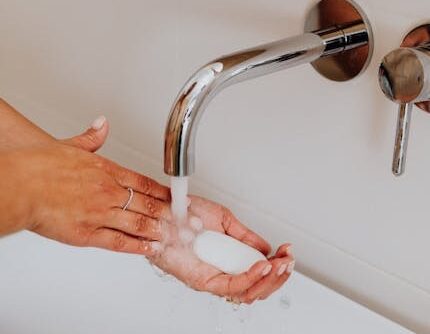“Wash your hands before you eat!” How many times were we told this as a child? How many times have we told our children (and grandchildren) the same thing? “Have you washed your hands?” we ask our grandsons before they sit down to eat.
There is a good reason for this, especially when the children are young – if their hands are filthy they will ingest whatever they have had their hands in (as children tend to eat at least some of their food with their hands). This is a very ancient question and practice.
“When Jesus had finished speaking, a Pharisee invited him to eat with him; so he went in and reclined at the table. But the Pharisee was surprised when he noticed that Jesus did not first wash before the meal.” (Luke 11:37-38 NIV)
We need to realise that the Pharisees took washing hands seriously and to the extreme. Rather than just washing their hands they washed all the way up to the elbows. Why? Because they might have come into contact with something or a person that was ‘unclean’ and they wanted to insure that they were totally clean so they did not contaminate themselves. They were fastidious to try to make sure that as far as their body was concerned they were ‘clean’. Sadly, that was about as far as their being ‘clean’ went. Jesus took this opportunity to teach them.
“Then the Lord said to him, ‘Now then, you Pharisees clean the outside of the cup and dish, but inside you are full of greed and wickedness. You foolish people! Did not the one who made the outside make the inside also? But now as for what is inside you – be generous to the poor, and everything will be clean for you.’” (Luke 11:39-41)
There was the problem. The Pharisees were so concerned to be sure they were physically ‘clean’ but they had not done anything to clean up their mind and thoughts. It was like washing dishes but only washing the outside of the cup or dish while not cleaning the inside of the cup or plate. It would be disgusting (and ‘unclean’!) to eat or drink from a dish that had not been properly cleaned on the inside. People need to do more than to just be clean physically but we need to be clean mentally and spiritually, as well.
So how do we become clean on the inside, in our mind? It has to do with what we do and how we think. For the Pharisees Jesus pointed out the need to be generous to the poor – something that is still needed today. The problem the Pharisees had is that they were so concerned to be seen to be religious yet in reality they really were corrupt.
“Woe to you Pharisees, because you give God a tenth of your mint, rue and all other kinds of garden herbs, but you neglect justice and the love of God. You should have practised the latter without leaving the former undone. Woe to you Pharisees, because you love the most important seats in the synagogues and respectful greetings in the market-places. Woe to you, because you are like unmarked graves, which people walk over without knowing it.’’ (Luke 11:42-44)
Notice that they wanted to be seen to be respected and meticulously keeping God’s law but in reality they were neglecting what was really important: justice and the love of God. As much as they tried to make sure they were ‘clean’ in reality the way they lived meant they were defiled – in God’s sight they were ‘unclean’.
What about us? Are we more concerned about looking good and being respected than we are about living faithful lives? Are we more concerned about physical cleanness than taking care of our thoughts so that they are clean? We need to concentrate more on serving God and not worrying about people seeing us do this. God will reward us if we are faithful.
Photo by Kaboompics.com from pexels.com. Free for use.
Readings for next week: Luke 8-12
- Different but working together - 2026-01-30
- Jesus our Passover Lamb - 2026-01-23
- Growing in faith despite difficult circumstances - 2026-01-16
